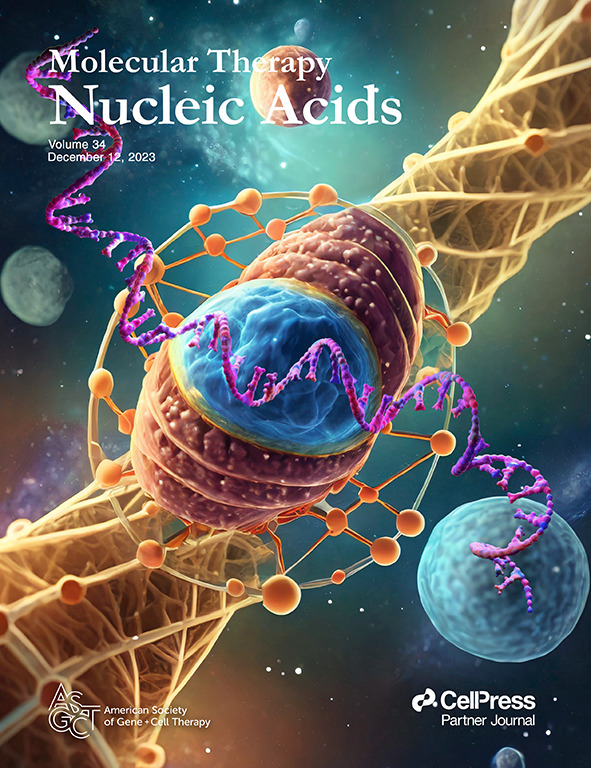LinQURE: A novel AAV gene silencing platform that supports multi-transcript targeting for complex disorders
IF 6.5
2区 医学
Q1 MEDICINE, RESEARCH & EXPERIMENTAL
引用次数: 0
Abstract
Given that numerous genetic disorders, driven by diverse pathogenic mechanisms, may be amenable to recombinant adeno-associated virus (rAAV)-delivered gene therapies, the sustained innovation of rAAV-based therapeutic modalities is crucial. The progression and severity of genetic diseases can be reduced by targeting the toxic transcripts of a defective gene using microRNA (miRNA)-based miQURE technology delivered within an AAV vector. By adapting the delivered cassette, it may be possible to simultaneously regulate the expression profile of multiple genes involved in the pathogenesis of complex genetic diseases. The established miQURE gene silencing strategy was expanded by concatenating several miQURE molecules in a single construct, resulting in the novel linQURE platform. Here, a proof of mechanism is established by demonstrating that linQURE technology enables the concomitant expression of two synthetic miRNAs and , allowing more efficient downregulation of their disease-causing mRNA targets. This approach supports the development of multi-targeting therapeutic strategies, enabling gene therapy products to adapt to more complex multigenic indications, thus expanding the toolbox of readily available gene therapies.LinQURE:支持多转录本靶向治疗复杂疾病的新型 AAV 基因沉默平台
鉴于由不同致病机制驱动的多种遗传疾病可能适合采用重组腺相关病毒(rAAV)载体的基因疗法,基于 rAAV 的治疗模式的持续创新至关重要。利用基于微核糖核酸(miRNA)的 miQURE 技术在 AAV 载体中传递,可以靶向缺陷基因的毒性转录本,从而降低遗传疾病的进展和严重程度。通过调整递送的基因盒,有可能同时调节涉及复杂遗传病发病机制的多个基因的表达谱。通过将多个 miQURE 分子连接到一个单一的构建体中,扩展了已有的 miQURE 基因沉默策略,从而形成了新颖的 linQURE 平台。在这里,通过证明 linQURE 技术能够同时表达两种合成的 miRNA,并能更有效地下调它们的致病 mRNA 靶标,建立了一种机制证明。这种方法支持多靶点治疗策略的开发,使基因治疗产品能够适应更复杂的多基因适应症,从而扩大了随时可用的基因治疗工具箱。
本文章由计算机程序翻译,如有差异,请以英文原文为准。
求助全文
约1分钟内获得全文
求助全文
来源期刊

Molecular Therapy. Nucleic Acids
MEDICINE, RESEARCH & EXPERIMENTAL-
CiteScore
15.40
自引率
1.10%
发文量
336
审稿时长
20 weeks
期刊介绍:
Molecular Therapy Nucleic Acids is an international, open-access journal that publishes high-quality research in nucleic-acid-based therapeutics to treat and correct genetic and acquired diseases. It is the official journal of the American Society of Gene & Cell Therapy and is built upon the success of Molecular Therapy. The journal focuses on gene- and oligonucleotide-based therapies and publishes peer-reviewed research, reviews, and commentaries. Its impact factor for 2022 is 8.8. The subject areas covered include the development of therapeutics based on nucleic acids and their derivatives, vector development for RNA-based therapeutics delivery, utilization of gene-modifying agents like Zn finger nucleases and triplex-forming oligonucleotides, pre-clinical target validation, safety and efficacy studies, and clinical trials.
 求助内容:
求助内容: 应助结果提醒方式:
应助结果提醒方式:


